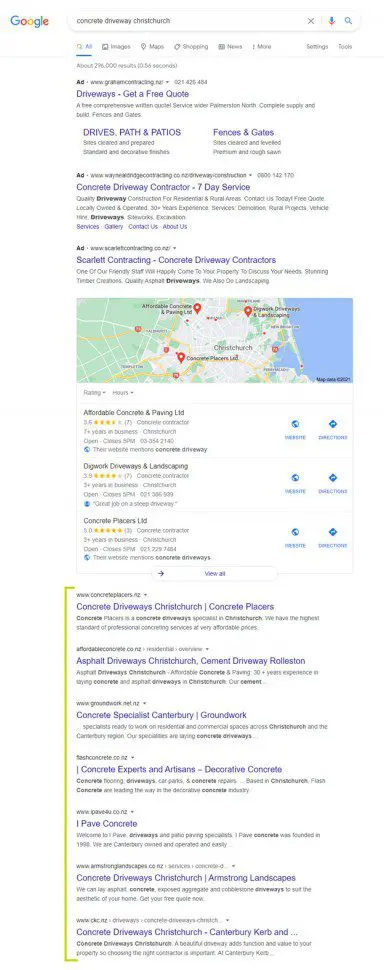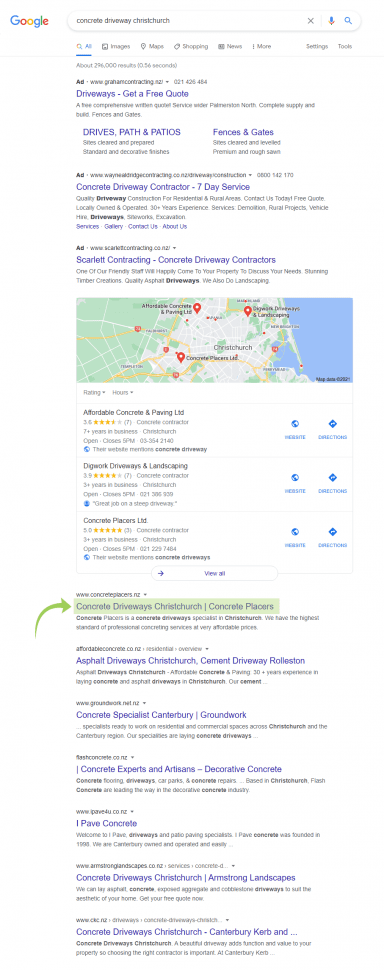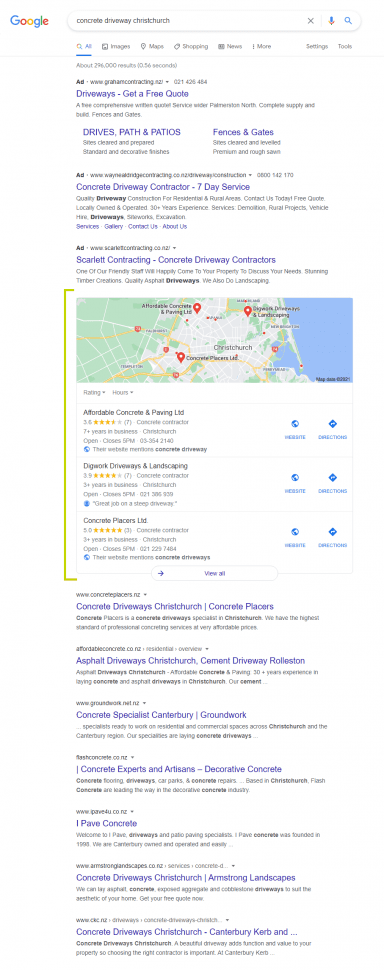As we mentioned in Part 1 of this series, your business’s website is your digital salesperson, and you should be doing everything you can to improve its visibility in your audience’s Google search results.
Organic Search, Local Search and SEO are what we’re covering here in Part 2 of our educational series designed to demystify search engine results pages (SERPs); the different elements found therein and what’s required to get your business appearing in each of them.
Organic Search Results are the mainstay of SERPs
Present in all SERPs (don’t quote us… Google might hear you and change this tomorrow!), Organic Search results are the non-paid (not pay-per-click [PPC]) listings featuring the website URL, the clickable blue link and (all things going well) a description of the featured page.
These listings (which we’ll refer to as organic results from here in) are effectively a *free form of online visibility and the channel of traffic they drive to your website is referred to as the Organic Search channel.
Clicks on these results don’t directly make Google money, which is why they are given less prominence than — and appear below — the Paid Search channel listings (Google Ads) that incur clicks costs payable to Google.
*they don’t incur click costs, but there’s still an investment inherent in optimising your website up to the standard where you will be vying for top spots in organic results. Then there is an ongoing investment to help ensure this standard is maintained throughout.
When are Organic Search listings shown in search results?
When a Google user performs a search, they are served a SERP including organic results from businesses who have optimised their website to be visible for the user’s searched keyword. The SERP pictured below shows organic results from companies who have optimised their websites for the keyword ‘concrete driveway christchurch’.
The better optimised a website is for the keyword, the better visibility it will have in organic results (i.e., it will appear higher on the SERP). This is why the SEO (search engine optimisation) services that Limelight and other digital marketing professionals offer are highly valued by switched-on companies.
Google has ended the ability to connect Google Ads Auction Insights data to Looker Studio reports. In this post we’ll cover why this data is important for guiding optimisation decisions for Google Ad campaigns. We’ll also discuss our workaround for this new limitation and what it means for you as a business owner that is familiar with receiving this type of info each month in your reports.
What is Auction Insight data?
Simply put, it is a collection of metrics that compare how a business’s Google Ads perform in auctions against other competitors. This info can reveal increased efforts from competitors and signal when to adjust bids, examine quality score, etc, to regain that prominent ad positioning.
Why did Google do this?
The reason for this is a mystery. Google has not made any announcements to explain this decision. The data is still available in Google Ads. However, the ability to adjust how that data is presented is limited in their platform. For us this has reduced the ease at which a quick analysis can be completed. One can speculate that removing this data connection takes some pressure off their infrastructure required for these data exchanges. Perhaps also improving some of their systems from potential security breaches.
Where to from here?
The question we need to ask is is it useful for business owners to receive this level of info? When a decision needs to be made to increase a budget or steer away from a specific keyword then this info should be brought to light. Auction insight data can help clearly demonstrate why this action needs to be taken and provides comparative data to show that these actions had a positive impact. It can be argued that this data should only be accessed and interpreted by a specialist, and presented to business owners when appropriate, such as during a scenario mentioned above.
Our thoughts
While there has always been some PPC specialists on the fence whether to divulge this data each month. Google has forced our hand here. Fortunately we still have access to this important data set to help us steer our efforts. The positive outcome is that we will simplify our reports for you and let you know when and if there are any concerns around increased activity from competitor activity that impacts your ads performance.

How do I “SEO” my website?
Google’s primary goal with their search engine is to serve users with the most relevant and helpful set of search results. They want to deliver a set of results that best matches the user’s intent or need. If they started serving irrelevant results that lead users up the garden path, we’d start using other search engines and Google would lose megabucks in Google Ads revenue — their highest earner.
Google’s algorithms consider some 200 signals when crawling your website and deciding if it has good SEO authority and features content relevant to a user’s search. These signals span from actions that fall under Technical SEO — which is very much under the bonnet of your website and requires industry professional knowledge to fettle, through to those considered On-Page SEO — which are more attainable to business owners, but still best leveraged by those who know what they’re doing.
The act of SEO management is continually assessing and optimising the areas of your website that Google algorithms assess when determining your visibility in Organic Search results. This encompasses everything from ensuring the right pages are being offered for crawling/indexing (you don’t want to waste crawl depth on your reset password page) and removing unnecessary 301 redirects and fixing broken/404ing pages, through to optimising page content and imagery, or identifying backlink opportunities.
To achieve this, we utilise various industry standard tools to monitor websites’ SEO authority, tracking their visibility overall and at the keyword level, and comparing their performance to that of their competitors.
Do I need to manage my website’s SEO and Organic Search visibility?
In the first instalment of this series, we talked about how Google Ads aren’t a set and forget channel, and the same can absolutely be said for Organic Search. SEO requires ongoing management to see how you’re doing in the eyes of Google, with visibility in search results being the trading currency of the Organic Search channel, rather than the impressions and clicks of Google Ads.
Many argue this is harder than managing a Google Ads campaign, as the criteria which we’re trying to meet with SEO management is kept close to Google’s chest, and it changes frequently with each Core Algorithm Update (not to mention the myriad of small updates they roll out without warning).
Fortunately, we’re constantly monitoring our clients’ performance and we’re part of a clever community who are constantly following Google’s every move, deciphering what pleases their search engine algorithms and what appears to have changed with each update and which industries have been affected.
What are the consequences of letting SEO management lapse?
Sure, you could throw caution to the algorithm wind and ignore your website’s SEO, but if you take your eyes (or those of your digital marketing partner) off the dials you’ll have no idea of how your Organic Search visibility is tracking against your competitors, and if it’s gone off a cliff since you last checked, you’ll be none the wiser.
To boot, you’ll also likely have no idea of the general health of your website, which can not only harm your organic visibility but can make for a horrific User Experience (UX) that will see visitors leave your website and bounce back to the SERP to find one of your competitors.
You may also not notice valuable backlinks that drive traffic to your site have long since disappeared, causing that traffic source and potential conversion pool to run dry.
Let’s say your website is a car, ignoring SEO could be compared to driving at night with your lights off and your temperature and fuel gauges disconnected — you have little indication you’re on the right track, others can’t see you (think of your headlights like the SEO signals Google reads), and you’re not able to monitor the vital signs meaning disaster could strike at any time and you’d have no warning until it was too late.
What is Local SEO, and do I need it?
A subset of SEO and the Organic Search channel is Local SEO. This pertains to searches of a local nature, including those for local businesses, services, or attractions in the user’s area. The image below is considered a local search because the keyword includes ‘Christchurch’. The user is obviously looking for a local Christchurch concrete merchant to build them a driveway.
Having solid SEO foundations is the first step to Local SEO optimisation. Combine this with a continually well-optimised website containing high-quality localised content and you’re on your way to sending strong local signals to Google.
Specifically, this is achieved in part by having your location featured prominently in page title tags and on-page content, including your address and phone number. See Concrete Placers’ organic result below for instance; their homepage title tag (which forms the blue text) features ‘Concrete Driveways Christchurch’, almost an exact match of the searched keyword. Spot on if their keyword research revealed this is indeed a popular keyword worth optimising for.

Creating a Google My Business listing for Map Pack inclusion
The other vital element you must be across for Local SEO is a Google My Business listing, which powers the Local Pack or Map Pack. The Map Pack is the section of the SERP featuring a Google Map and three business listings featuring their details such as reviews, opening hours, years in business, plus links to their website or directions to their address.
The Map Pack is the heart of Local SEO and is powered by Google My Business (GMB) listings which businesses (or their marketing team) create and manage. A well-managed GMB listing combined with healthy overall SEO will help give you visibility in the Local Pack for searches that relate to your service offering and location.
We recommend a GMB listing and Local SEO management for almost all businesses, especially those with a bricks and mortar presence which customers visit (e.g., business who want visibility for searches like ‘sydenham physiotherapist’, ‘rangiora cafes’, ‘christchurch climbing wall’, etc). Clicking on a GMB listing in the map pack (and often searching for a business by name) will produce the GMB listing in full where additional information like a business description, reviews, and posts (which are effectively like social posts) is shown.

What Does Local SEO Management Look Like?
Effectively Local SEO management can be split into two objectives: brand awareness and NAP Consistency.
Brand Awareness — this means keeping your GMB listing information up to date and featuring correct details, new photos and posts to maintain/promote your brand as a personable group of people who value their customers and want to keep them in the loop. Ultimately, this means treating your GMB listing like a social account (i.e., Facebook, Instagram, LinkedIn).
NAP Consistency — one of the most prolific Local SEO signals Google monitors is how consistent/accurate your NAP (name, address, phone number) information is across the various business directories you’re listed in. If there’s inconsistency throughout these, your signal is weakened because the Google algorithm starts to question which of the various names, addresses and/or phone numbers attributed to your business is actually yours.
If you appear to have multiple conflicting identities, you’ll start to look untrustworthy with diminished industry authority and expertise, and this can result in a lack of visibility in Local Organic Search. Ultimately Google wants to ensure the results they’re displaying in their local search results are accurate.
Staying on top of any citations across these business directories and remaining vigilant of new listings (because in reality you have limited control over which directories list your business) helps you keep all your NAP ducks in a row, putting forth a strong Local SEO signal for Google.
This work is time consuming (not to mention highly monotonous) so is often overlooked and underutilised by SMBs, but can easily be taken off your hands by a suitable digital marketing agency.
Read about claiming your free Google My Business Listing.
SEO Is Best Considered From Day One, But It’s Never Too Late
Creating strong SEO and Local SEO signals needs to be a key consideration when building a website. It should be considered from day one of your project to create a solid base that can be easily optimised over time.
SEO considerations (or a lack thereof) are often one of the reasons why some web designers build websites so cheaply. But like most things, you get what you pay for — a website built without SEO in mind may look nice enough and leave more money in your account, but it will likely struggle to attain visibility in Google Search results, meaning less web traffic and conversions for your bottom line.
Like buying a cheap used car, building a “cheap” website may save you money in the short term but the SEO corners that will have been cut will see you losing money over time, hindering your ROI in the long term.
That said, if you “saved money” on your website and are now struggling to break into Organic Search results, sometimes it’s best to call in the professionals and consider an audit of your website’s SEO. Producing actionable recommendations that you, your developer, or the agency completing the audit can carry out, these audits are about cleaning up the mess and putting your best foot forward for improved SEO strength and Organic Search visibility.
How Much Money Should I Spend On SEO?
The answer to this complex question is almost the same as when deciding how much to spend on your new car… as much as you can afford at the time.
Of course, you’ll need to be realistic about what you expect to get back — if you spend peanuts, you’ll get monkeys. We recommend discussing SEO with the partner who is building your website at every juncture (i.e., “how will that option affect my SEO”?) and quizzing them on their SEO approach before you even sign on the dotted line, so you know how seriously they’re going to take it before you commit.
If you want to forego SEO management and save a buck… DON’T! Think about the driving in the dark analogy and ask yourself what sort of website you actually want to drive, and where you want the journey to take you. We recommend looking at investing in ongoing SEO management services, looking at it as an insurance policy for your visibility in Organic Search results.
How Much Management Does My Website’s SEO Need?
We recommend striking up a reciprocal relationship with your SEO services provider, relying on them to keep their eyes on your Organic and Local Search visibility dials, while collaborating with them to implement SEO improvements/maintenance, creating content, and keeping them up to date with any changes to your service offering or business goals.
In terms of time, our advice is to allocate a minimum of 2–3 hours per month for monitoring and investigating the various elements of your Organic and Local Search visibility. Some months this time will include fixes, while other months it may comprise primarily of monitoring/investigative actions. Either way, simply ‘doing SEO’ as a one-off and not considering it an ongoing process seldom achieves optimal results.
To this end, you should also reserve some capacity at your end to act upon insights and recommendations provided by your SEO provider. For example, they may suggest rewriting a particular page with more emphasis on a certain keyword theme to improve the content and its SEO signal.
Another scenario you should allow for is fixing or chasing backlinks on external sites you may (or may not) have a relationship with (i.e., a backlink to your website may not have been updated since the page’s URL changed, or a backlink may have been removed from a partner or supplier’s website, and you’ll need to contact these businesses, leveraging your relationship to remedy the issue).
Is Organic Search The Right Channel For Your Business?
Organic search is very much the baseline for online visibility, as despite SERPs presenting in a wide array of formats, organic results are the mainstay that will likely be present no matter what. A strong SEO and Local SEO game is essential for your website and shouldn’t be overlooked in your digital marketing strategy.
Contact us to discuss your website’s SEO or request an audit of your website.
And be sure to come back for future series instalments which will cover Google Shopping Ads, Social Media and more.
